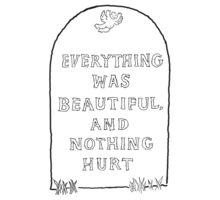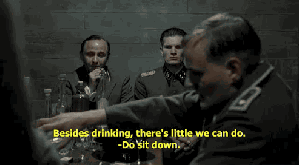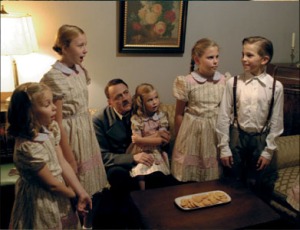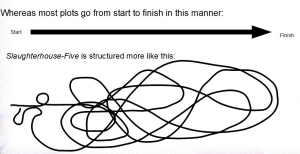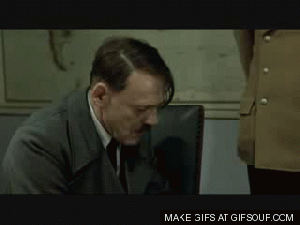Today’s blog post will discuss Hirschbiegel‘s Downfall and Vonnegut’s Slaughterhouse Five. You might recognize Downfall from the various “Hitler Reacts To…” videos. However, the movie is so much more than one angry Hitler rant, it’s 20+ angry Hitler rants.
Downfall does something that cinema has never done before, and hasn’t done since – it portrays Hitler in the most human way possible. The movie covers the last ten days of Hitler and Eva’s life, focusing on the breakdown of the Third Reich and the SS and the breakdown of Hitler himself. Over these ten days, Downfall deals with some very heavy themes – innocence, naivety, loyalty, suicide, and hope. At the beginning of the film, it seems as if Hitler is the person with the most hope, something that is hard to imagine, but incredibly powerful to watch. He believes in some miracle victory against the Allies whilst watching Berlin crumble all around him. You almost feel sad for him. As the movie progresses, it becomes more apparent that his hope is really delusion. Hitler has become a man calling for troops that “only exist on his map”. As his men watch his capability collapse, they either choose to flee him, risking treason, or stand with him even after the end.
All the while, we see this through the eyes of the naive secretary to Hitler, Traudl Junge. In an interview clip at the start of the film, Junge says, “I’ve got the feeling that I should be angry with this child, this young and oblivious girl. Or that I’m not allowed to forgive her for not seeing the nature of that monster. That she didn’t realise what she was doing. And mostly because I’ve gone so obliviously. Because I wasn’t a fanatic Nazi. I could have said in Berlin, ‘No, I’m not doing that. I don’t want to go the Führer’s headquarters.’ But I didn’t do that. I was too curious. I didn’t realise that fate would lead me somewhere I didn’t want to be. But still, I find it hard to forgive myself.” In the end, she realizes that her innocence and naivety weren’t excuse enough, saying, ” All these horrors I’ve heard of during the Nurnberg process, these six million Jews, other thinking people or people of another race, who perished. That shocked me deeply. But I hadn’t made the connection with my past. I assured myself with the thought of not being personally guilty. And that I didn’t know anything about the enormous scale of it. But one day I walked by a memorial plate of Sophie Scholl in the Franz-Joseph-Strasse. I saw that she was about my age and she was executed in the same year I came to Hitler. And at that moment I actually realised that a young age isn’t an excuse. And that it might have been possible to get to know things.”
In the movie, however, those who really did know what was going on did things even worse than doing nothing. With the suicide of Hitler and his wife, came waves of suicides in the film. Most shockingly though, was the scene in which Joseph Goebbels watches Magda Goebbels kill their children one by one in the bunkers, fearing life in Germany without Hitler more than death itself. After this, many of the remaining officers shot themselves as only one man, Prof. Ernst-Günther Schenck, questions their desire for death.
At the end of Downfall, most of those close to Hitler have died or been captured by Soviets. The only glimpse of hope comes from the scene in which Traudl Junge and a little Nazi boy (I forgot to mention all of the child soldiers) ride away from the battlefield on a bicycle.
Downfall and Slaughterhouse Five could easily be compared to each other,as different as they are. While both works deal with the involvement of children in WWII, Downfall approaches it through the eyes of the adults, the decision makers, while S5 tells the story through Billy Pilgrim. Billy is an annoyingly stagnant character, a necessity for a book with a plot line such as this:
Another thing I noticed was that Billy had to create the Tralfamadorians and steadfastly believed in a deterministic universe to cope with the effects of WWII. In class, I asked why Billy Pilgrim never killed himself, having such a bleak outlook on life, and was answered that committing suicide would mean his surrender to free will. However, in Downfall, death seems like this inescapable force that most men succumb to, specifically through suicide, while only the brave, sane men decide to live.
I also saw a strange similarity between Hitler and Ronald Weary during the film. Weary had always longed to belong and have friends who didn’t abandon him, but he was abandoned until the day he died. Hitler’s men abandoned him one by one until the day he died while he had to sit back and watch his power disintegrate before his eyes. Upon capture, Weary blames his death on Billy Pilgrim (an innocent), and makes the men around him swear to avenge his death. Hitler blames his loss on his weak soldiers, eventually ordering their deaths because they “abandoned” him because they left Berlin to survive, after this he goes even further, blaming everything on the German people, blaming everyone but himself.
When reading a book about an American soldier, and watching a movie about Hitler, you would expect to empathize and feel hatred for the other. What I love about S5 and Downfall, is that I only felt indifference towards Billy Pilgrim, while I caught myself almost pitying Hitler. (Impressive considering I had a Bat Mitzvah.)
